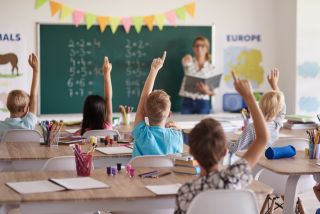Education
Education: The Great Equaliser or a Divider?
How "equal opportunities for all" might be unfair from the first day of school.
Updated May 22, 2024 Reviewed by Michelle Quirk
Key points
- Children who perform better at school go on to have greater life success.
- Children from disadvantaged backgrounds lag behind in key skills and abilities at school entry.
- These children also perform worse in later school than those from advantaged backgrounds.
- Socioeconomic barriers prevent children from utilising educational opportunities equally.

By Kirsty Wilding
Horace Mann, a pioneer of American public schools in the 19th century, famously called education the “great equalizer.” What he meant was that education could be a force to even out the disparities between people. Providing high-quality free education to all children regardless of their origins was a means by which those without privilege or generational wealth could experience hope of equal footing.
In meritocratic societies, like Britain, education policy typically focuses on creating "equal learning opportunities," where all children are taught the same curriculum, at the same pace, by the same methods, regardless of their differences in ability, skills, and interests. This is different from "equity of educational outcomes" where, in theory, all children, regardless of their differing abilities, are able to achieve the same academic results. One way to achieve equity in education is by allocating greater support and resources to the children who struggle most in school.
But, if children who perform poorly at the beginning of school continue to struggle throughout school, is education really a great equaliser, or is it possibly more of a great divider?
The notion that schools increase, rather than reduce, children’s differences in life chances appears correct when we consider that children who earn better grades go on to have greater life success. For example, in a U.K. representative sample, students who excelled in their exams were much more likely to go on to university and achieve a first-class degree, whereas less than 10 percent of students who struggled to pass their exams went on to university.
Children enter school on unequal footing.
Before children even enter education, their life experiences differ substantially. Children’s family background (e.g., how educated their parents are or how much household income their family has at their disposal) is a powerful predictor of their school readiness—a combination of children’s school-entry skills, attention skills, and socioemotional skills. Children from more advantaged family backgrounds tend to be better prepared for school (they have higher school readiness) than kids from underresourced families.
We know that preschool education helps better prepare children for school, but for some families the costs of preschool are simply too high to pay. The average cost of part-time preschool (25 hours) for children under the age of 2 years in 2024 is £8,194. In the United Kingdom, families do not gain access to any form of free childcare until children are two years old, when families receive 15 hours free, increasing to 30 hours after the age of three. This is reflected in the proportion of families who utilise preschool childcare when kids are 0 to 4 years old. Three-quarters of upper- and middle-class families send their children to preschool, compared to only half of low-income families.
According to teachers, 39 percent of children enter reception class unable to hold a pencil, 36 percent lack basic numeracy skills, and 25 percent struggle with basic language.
As children’s language develops, they begin building the foundations for literacy, reading, and writing, which are key to doing well in class. But we know children arrive at school with very different language abilities: Some show signs of developmental language disorders, some struggle with reading because they are affected by dyslexia, and some have not been much exposed within their family homes to the language that is typical in school settings. That means that some children are better prepared than others for school. These children are more likely to participate in classroom discussions and to enjoy doing their homework, thereby gaining richer learning experiences than other kids.
Performance remains unequal throughout school.
Children from advantaged family backgrounds do better in exams when they start school and continue to do so as they go through the primary and secondary school years. The differences in children’s school performance actually magnify and get larger as children grow up.
The relationship between family background and school performance has remained stable for almost a century in Britain, with children from more advantaged family backgrounds consistently performing better. This finding suggests that current policies aimed at bridging the gap between children from advantaged and disadvantaged homes have been mostly unsuccessful.
We must therefore ask ourselves whether the current education system, equal opportunities for all, is actually unfair from the very beginning.
Socioeconomic barriers prevent children from utilising opportunities equally.
Creating equal learning opportunities for all students will not produce fair education systems if students differ in their abilities to utilise these opportunities. To be fair to all, education systems need to adapt to students’ differential learning needs and backgrounds, offering additional help and support to those who need it, and acknowledging that children enter education on very different footing.
In the United Kingdom, the pupil premium reflects this idea: Schools receive additional funding to afford extra educational resources to help students from disadvantaged backgrounds overcome their disadvantages in education. Ofsted has reported that pupil premium has made a positive impact across many U.K. schools, with gaps in attainment between those pupils eligible for free school meals and those who are not slowly closing.
How do we achieve both equity and equality?
Some suggest that aiming for educational adequacy is what is most fair, whereby some inequality in opportunities is acceptable, and at-risk children should be provided with additional support and resources. In theory, this would allow all students to develop the basic competencies necessary to live rich, meaningful, and fulfilling lives. But what society deems as the "basic competencies" remains unanswered.
What we do know is that “equal societies almost always do better,” and ensuring all children have an equal chance to benefit from the opportunities schooling offers and achieve their full potential regardless of barriers needs to be the primary aim of educational policy.




